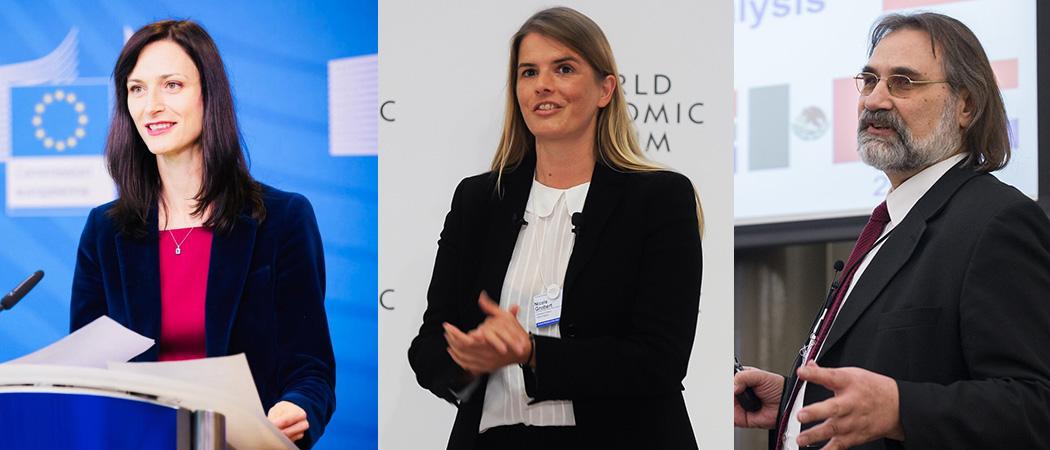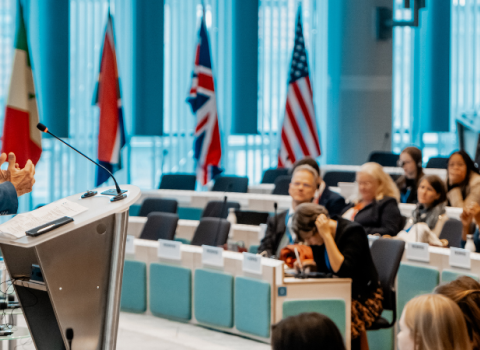Technology and regulation alone will not deliver a climate neutral energy system. A people-centred approach is needed for a successful transition - in which low carbon lifestyles are no longer seen as an alternative, but become the default option

Mariya Gabriel, Research Commissioner, Nicole Grober, chair of European Commission’s group of chief scientific advisers, Nebojsa Nakicenovic, deputy chair of the group
‘Climate change is the single most serious problem facing the world’, according a recent Eurobarometer study. With its European Green Deal initiatives the European Commission has set the ambition of limiting global warming to less than 1.5 degrees. Transforming the energy system, making it cleaner and more sustainable, is one of the necessary steps to climate neutrality.
Research and innovation are crucial to reach a future where renewable sources replace carbon-based energy, electricity is substituted for fossil fuels in transport and industry, and access to clean energy is guaranteed to all.
Horizon Europe, the 2021 - 2027 EU research and innovation programme was set up in collaboration with member states and the European Parliament to recognise this. Overall, 35% of the budget is dedicated to climate, including the missions on ‘A climate resilient Europe’ and ‘Climate-neutral and smart cities’, as well as a number of research and innovation partnerships with industry.
Scientists issued a stark warning about the need for urgent action to tackle climate change in the latest report by the United Nations Intergovernmental Panel on Climate Change (IPCC). In December, the United Nations will host the first high-level dialogue on energy in four decades, and before that all eyes will be on the COP26 climate change conference in November. These meetings are important because reaching global consensus is of pivotal importance to achieve universal access to energy services and end-to-end decarbonisation.
But focusing on technology and regulations alone will not suffice to achieve a climate neutral society by 2050, as the European Commission’s group of chief scientific advisers warn in their latest scientific opinion. They strongly recommend a people-centric systemic approach that actively involves everyone in the clean energy transition.
More specifically, the advisers say the energy system “[…] is not only technological in nature, but also social in its organisation and is an integral part of society.” These dimensions should be better integrated into energy policy. New inclusive governance approaches are needed to make the transition successful and just.
The advisers note that a shift in individual behaviour, such as using higher efficiency appliances and driving green cars, could significantly reduce global emissions. Changes in hot water use, insulation of buildings and smarter use of air conditioners and heat pumps could reduce energy demand from buildings by almost 50 %.
For people to change their behaviours, neither economic incentives nor top down policy actions are enough. Important individual and collective choices are also shaped by sociocultural factors that influence consumers, producers, stakeholders and community members. The green energy transition can be made a success by creating an environment that supports low carbon lifestyles and makes them the most natural choices for the individual. This concept can be realised by recognising that energy efficiency, decarbonisation and reduction of energy use are not only steps towards reducing emissions, but also have a positive direct impact on individual wellbeing.
Renovating buildings across the EU to make them energy efficient can be combined with measures to protect against the effects of seismic and extreme weather events. Taken together, they would significantly improve the quality of citizens' lives. The New European Bauhaus, an interdisciplinary initiative which aims to design future ways of living, taking inspiration from art, culture, social inclusion, science and technology, is an example of incentives for the holistic approach this calls for in shaping the way forward.
Digitalisation adds to these transformations by providing a resource for smarter energy consumption, while delivering more efficient services to end users.
As the advisers stress, Europe is well placed to show global leadership in the fight against global warming. It can and should strive to become the first climate neutral continent, boost its competitiveness with carbon free products and services, and steer the world towards more sustainable, socially aware, global development. As a central pillar of this, the EU should devise an effective, consistent and just regulatory system, with a clear direction set for the common goals of climate neutrality and sustainability.
Europe has the outstanding science and innovation environment needed to drive its technological development. Under Horizon Europe, this will be further nurtured and developed. But most importantly, the EU must put people at the centre of its climate change policies.
Inevitably, certain households, regions and sectors will bear a higher cost, which could especially hurt those already facing energy poverty. Acknowledging and openly discussing the vast range of social, economic and legal perspectives and inequalities inherent in energy development and use is a necessary step to solve this problem.
It will be necessary to create safety nets to make sure that nobody is left behind, such as the Social Climate Fund proposed by the Commission as part of the “Fit for 55” legislative package to support vulnerable households, micro-enterprises and transport users through the energy transition.
Science shows the way forward to address complex challenges where people, technology and the environment meet. Younger generations are well aware of this and are raising their voices, asking us to help protect the planet they will inherit. Policymakers should hear and engage with them, along with researchers, entrepreneurs and all other parts of society
We can meet our ambitious targets only if we are capable of exploiting new knowledge across many fields of science and technology. New talents must be brought into research and we must communicate with clarity on the challenges and on the proposed answers.
In short, the involvement of citizens will be crucial to capture the necessary energy and consensus in shaping a decarbonised future.
Mariya Gabriel is Commissioner for Innovation, Research, Culture, Education and Youth. Nicole Grobert and Nebojsa Nakicenovic are chair and deputy chair, respectively of the European Commission’s group of chief scientific advisers





 A unique international forum for public research organisations and companies to connect their external engagement with strategic interests around their R&D system.
A unique international forum for public research organisations and companies to connect their external engagement with strategic interests around their R&D system.